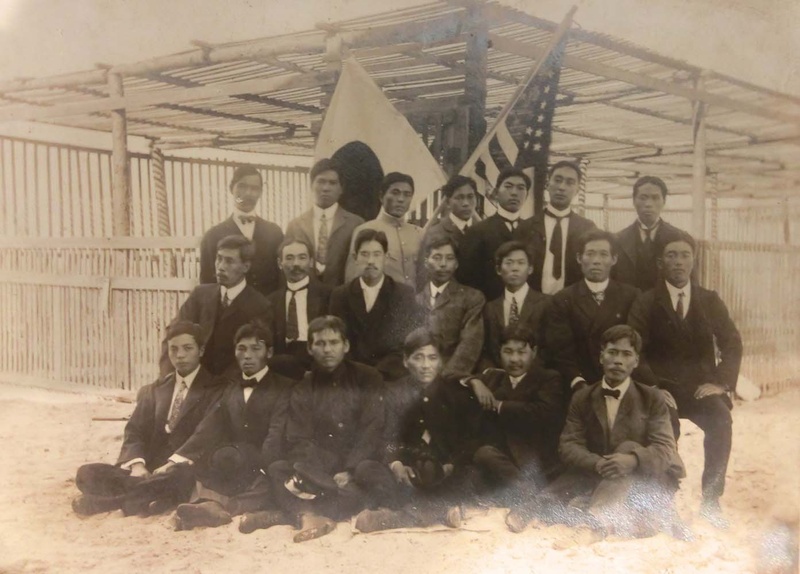In the early 20th century, Yamato Colony, a Japanese village, appeared in southern Florida. Morikami Sukeji (George Morikami), who immigrated from Miyazu, Kyoto City as a farmer and pioneer, stayed on even after the colony was dismantled and disappeared before the war, and continued farming alone through the war (see Part 1 for details ). In the end, he donated a huge amount of land, leaving his name in the local area. He remained single throughout his life and never returned to Japan, but he longed for his homeland more than anyone else and continued to write letters to Japan. In particular, he frequently corresponded with the Okamoto family, including the wife and daughters of his late brother. Although he had never met them, he treated them like family and sent them information about the situation and his thoughts in Japan.
* * * * *
"A carefree life alone, but always longing for home. And the death of a compatriot."
Month 1950, To Mitsue Okamoto
I sent the requested amount of $100 on the 24th.
The weather is changeable and I'm busy, so I don't have time to rest. I'm exhausted both physically and mentally, but there are also sleepless nights. At times like that, I think about life in many ways.
It seems that the more greedy a person is, the more suffering they face, and their suffering will not stop until they die. I have come to believe that the greatest happiness in life is to have enough food, clothing, and shelter, and to be healthy. I live in a leaky thatched hut, drive a rickety car, have no radio, and read newspapers and magazines by the dim light of an oil lamp. My greatest joy is to go to bed tired.
There is no news from home, nor is there any expected of it. Everyone misses home, but this is especially so for those who live far away and don't have long to live.
"It has been over 44 years since Sukeji left his hometown."
The cedars and cypresses I planted in my hometown must have grown big by now. But when I returned, I found that the mountains and rivers were just as they were in the past, but there were very few people I knew, and I was treated coldly by the people who passed by...I shouldn't have come back if it was going to be like this.
Regarding Reiko's (Suketsugu's niece) marriage, you should think about your partner based on his character, not on status or wealth. Since you will both have likes and dislikes, forcing someone into something they don't want to do is unfortunate.
Today's local newspaper reports the deaths of two of our compatriots. Many of our first generation of Koreans in America are now reaching old age and are dying one after the other. One was a 67-year-old Kyushu man who shared the same rice pot with us 45 years ago, and the other was an 82-year-old farmer 50 miles northwest of here, also from Kyushu. He hanged himself in despair.
I am in good health so far, and I don't think I'm going to die anytime soon. I have a mountain of work to do, and it's not going as I want it to. I wanted to import sweet potatoes from Japan, but I couldn't get permission because it's strictly prohibited.
<Crops damaged by severe cold wave... almost caused a major accident>
December 1950, To Mitsue Okamoto
Thank you for your letter. I have not written to you for a while. I have been very tired, so please forgive me.
Yesterday, a cold wave suddenly hit, causing a great fuss for a while. According to the newspapers and the weather forecasts on the radio, it was the coldest it had been in over a decade, with temperatures dropping to around 25 degrees (minus 3.9 degrees Celsius) , and there was a risk that all the agricultural produce in Florida would be destroyed. A slight chill had been expected, but this level of cold was completely unexpected. A strong northwest wind began to blow. If it had blew through the night, there was a risk that all the produce would be destroyed. However, the wind gradually died down, and the temperature did not drop below 35 degrees (1.7 degrees Celsius) , so major damage was avoided.
Due to the cold wind, all the cucumber trees in Futanabe-cho (1 acre is 4,047 square meters. Futanabe-cho is slightly larger than a soccer field) were destroyed, but the eggplants and tometou were saved.
For someone like me who is used to living in a warm country, this cold really is a burden. The blacks who work in the fields wouldn't work on a day like this, even if they were paid twice as much. Last Friday, I picked 31 boxes of eggplants that had withered after Storm . The market price isn't good, but they sold for a high price when they were in short supply. Today, as soon as the morning dew dries, I plan to pick the rest. I expect to have about 30 boxes. Even a small income like this is a great help when you're struggling financially.
If the weather improves in the future, we will be able to earn income from the crops we planted after the storm, which will be a great help.
By the way, last Saturday, I had an unexpected accident. At a crossroads near my farm, a car came flying at high speed and crashed into the side of my truck, causing it to overturn. Both cars sustained damage, but I was lucky enough to not get a single scratch. It was a blessing in disguise.
I guess I was saved because I was carrying a heavy load. If it had been empty, my truck would have been blown away and thrown into a nearby canal, and I would have been wandering between hell and heaven right now. In this country with a lot of cars, many people die or get injured every day.
Eighty to ninety percent of accidents occur due to carelessness. I'm a country boy, so I don't drive to crowded towns in Miami because it's too dangerous. Please don't worry too much.
(Titles omitted, * indicates notes by the author)
Reference: Yamato Colony and Morikami Sukeji. From "Yamato Colony: The Men Who Left Japan in Florida" (by Kawai Ryusuke, Shunposha)
© 2019 Ryusuke Kawai







